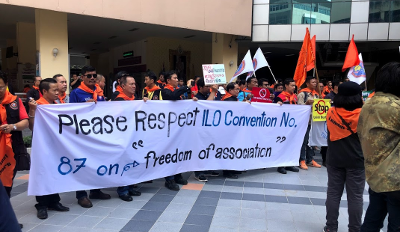
In the wake of the U.S. government suspending billions of dollars in trade preferences for Thailand due to worker rights issues, organizations participating in the Seafood Working Group released a statement on Human Rights Day strongly urging the Thai government to undertake the necessary reforms to have the trade benefits reinstated. The 24 organizations also urged global companies buying seafood from Thailand to ensure that workers’ rights are fully protected in their supply chains.
On October 25, 2019, the United States Trade Representative (USTR) announced that it would suspend $1.3 billion in trade preferences for Thailand under the Generalized System of Preferences (GSP) due to Thailand’s failure to adequately provide internationally recognized worker rights, particularly lack of protection for freedom of association and collective bargaining. In 2015, the USTR warned Thailand of its failure to meet the eligibility criteria for the GSP program with respect to freedom of association, collective bargaining, acceptable conditions of work, and forced labor.
"The decision to revoke GSP benefits shows the Thai government that the international community intends to hold countries that repeatedly and consistently violate fundamental worker rights accountable,” said AFL-CIO International Director Cathy Feingold. “Workers in Thailand on farms, in factories, and on the seas have a right to decent, safe work, and their abuse must end now,” said Feingold, who also serves as deputy president of the International Trade Union Confederation (ITUC).
Thai trade unions and worker rights organizations in Thailand have for decades been calling for legal reforms to guarantee all workers’ rights to freedom of association and collective bargaining and to end egregious labor rights abuse. They have participated in multiple committees and consultations with the government on proposals for labor laws. They have submitted a variety of recommendations on labor law reform. Every step of the way they have been ignored or marginalized, or worse, harassed and persecuted.
“This statement is to send a clear message to the Thai government and companies that the Thai labor movement and migrant workers in the country have international solidarity and support not only from labor organizations, but also other types of organizations concerned with business and human rights involved in the Seafood Working Group,” said the International Labor Rights Forum’s Senior Seafood Campaign Coordinator, Kimberly Rogovin.
GSP program eligibility will be revoked for 573 products on April 25, 2020, including for all seafood products, according to a statement from the USTR: “due to longstanding worker rights issues in the seafood and shipping industries.” Members of the Seafood Working Group and other organizations have consistently documented labor abuse and forced labor of migrant workers in the seafood and fishing sectors, linking such exploitation to legal discrimination against migrant workers and denial of their fundamental rights to freedom of association and collective bargaining.
“The fundamental problem is Thailand’s labor laws don’t meet international standards and a lack of serious enforcement means companies easily get away with abuses. Law reforms are urgently needed to ensure workers can establish and lead their own unions, regardless of nationality, and to prevent retaliation and firings of union leaders for standing up for their rights,” said Phil Robertson, Deputy Asia Director of Human Rights Watch.
A global coalition of human rights, labor rights, and environmental organizations, the Seafood Working Group is extremely concerned about widespread abuse and denial of workers’ fundamental rights across the whole economy, concerning Thai and migrant workers alike. Members are calling on the Thai government to reform labor legislation, end legal and judicial harassment of labor rights defenders and collaborate with worker organizations to end labor exploitation.
The statement also urges leading companies exporting and sourcing seafood from Thailand, particularly members of the Seafood Task Force, to call publicly on the Thai government to reform national legislation in line with international standards and ensure workers’ labor rights are respected in workplaces within their own supply chains.
“Companies should assume their responsibility to ensure internationally recognized worker rights in their supply chains, and work with their suppliers in Thailand to eradicate abuses and enable the right to freedom of association and collective bargaining. Now is the time for Thai seafood companies and their buyers, such as global supermarkets, to walk the talk, act to end abusive practices, and show how it can be done systematically,” said Art Prapha, Oxfam America’s Senior Private Sector Advisor.
The Thai government was given six months, until April 25, 2020, to make changes to become eligible for trade privileges again in 2021. The group strongly urges the Thai government and all relevant companies to act quickly and support meaningful reforms that are long overdue.
The Seafood Working Group is a global coalition of human rights, labor rights and environmental organizations working to end forced labor and ensure decent working conditions in the Thai seafood industry.
กลุ่ม Seafood Working Group เรียกร้องให้รัฐบาลไทยยุติการทารุณกรรมแรงงาน จากกรณีรัฐบาลสหรัฐฯ ตัดสินระงับสิทธิพิเศษทางการค้าของประเทศไทย
จากกรณีรัฐบาลสหรัฐฯ ได้ระงับสิทธิพิเศษทางการค้ามูลค่าหลายพันล้านเหรียญฯ ของประเทศไทย เนื่องจากประเด็นด้านสิทธิแรงงาน องค์กรสมาชิกต่างๆ ในเครือข่าย Seafood Working Group ได้ออกแถลงการณ์ในโอกาสวันสิทธิมนุษยชนนี้ เพื่อเรียกร้องให้รัฐบาลไทยดำเนินการปฏิรูปที่จำเป็นอย่างจริงจังเพื่อนำสิทธิประโยชน์ด้านการค้าดังกล่าวกลับคืนมา องค์กรสมาชิกทั้ง 24 องค์กรยังต้องการเรียกร้องให้บริษัททั่วโลกที่ซื้ออาหารทะเลจากประเทศไทยรับประกันว่า สิทธิแรงงานจะได้รับการคุ้มครองอย่างเต็มที่ตลอดทั้งห่วงโซ่อุปทานของตน
วันที่ 25 ตุลาคม 2562 สำนักงานผู้แทนการค้าสหรัฐอเมริกา (USTR) ประกาศว่า รัฐบาลสหรัฐฯ จะตัดสิทธิพิเศษทางการค้ามูลค่า 1.3 พันล้านเหรียญฯของไทย ภายใต้ระบบสิทธิพิเศษทางภาษีศุลกากรเป็นการทั่วไป หรือ Generalized System of Preferences (GSP) เนื่องจากประเทศไทยไม่สามารถคุ้มครองสิทธิแรงงานตามมาตรฐานที่ยอมรับได้ในระดับสากล โดยเฉพาะการคุ้มครองเสรีภาพในการสมาคมและการเจรจาต่อรองร่วม ในปี 2558 สำนักงานผู้แทนการค้าสหรัฐอเมริกาได้ทำการตักเตือนประเทศไทยที่ไม่สามารถทำตามเกณฑ์คุณสมบัติของโครงการ GSP ในด้านเสรีภาพในการสมาคม การเจรจาต่อรองร่วม สภาพการจ้างงานที่เป็นธรรม และการบังคับใช้แรงงาน
“การตัดสินใจในการเพิกถอนสิทธิพิเศษภายใต้โครงการ GSP นี้ แสดงให้เห็นว่ารัฐบาลไทยที่ประชาคมสากลยอมรับนั้นยังคงมุ่งมันที่จะละเมิดสิทธิแรงงานขั้นพื้นฐานของคนงานอย่างต่อเนื่องอยู่เสมอมา” Cathy Feingold ผู้อำนวยการด้านแรงงานสากล AFL-CIO กล่าว “แรงงานในประเทศไทยทั้งในฟาร์ม ในโรงงานต่างๆ และแรงงานในทะเลจะต้องได้รับสิทธิในการทำงานที่มีคุณค่า ปลอดภัย และการถูกละเมิดสิทธิต่างๆของพวกเขาเหล่านั้นจะต้องหมดไป” Feingold ผู้ซึ่งดำรงตำแหน่งรองประธานสมาพันธ์สหภาพแรงงานสากล (ITUC) อีกด้วย กล่าว
สหภาพแรงงานและองค์กรด้านแรงงานในประเทศไทยได้พยายามเรียกร้องเป็นเวลาหลายทศวรรษเพื่อให้เกิดการปฏิรูปทางกฎหมายเพื่อประกันสิทธิของแรงงานด้านเสรีภาพในการสมาคมและการเจรจาต่อรองร่วมและยุติการทารุณกรรมแรงงานอันเลวร้าย พวกเขาได้เข้าร่วมคณะกรรมการและการประชุมปรึกษาหารือกับรัฐบาลหลายต่อหลายครั้งเพื่อนำเสนอข้อเสนอทางกฎหมายต่างๆ รวมทั้งยื่นข้อเสนอแนะต่อการปฏิรูปกฎหมายแรงงาน แต่ในทุกครั้งกลับถูกเพิกเฉยหรือแม้แต่เผชิญการคุกคามและการดำเนินคดีจากการกระทำดังกล่าว
“แถลงการณ์ฉบับนี้ออกมาเพื่อส่งสารไปยังรัฐบาลไทยและบริษัทไทยอย่างชัดเจนว่าขบวนการแรงงานไทยและแรงงานข้ามชาติในประเทศไทยได้รับการสนับสนุนจากทั่วโลก ไม่เพียงองค์กรด้านแรงงานเท่านั้น แต่ยังรวมถึงองค์กรอื่นๆ ที่ทำงานด้านธุรกิจและสิทธิมนุษยชน ซึ่งเป็นสมาชิกของ Seafood Working Group” Kimberly Rogovin ผู้ประสานงานการรณรงค์ด้านอาหารทะเลอาสุโสจาก ILRF กล่าว
จากแถลงการณ์ของสำนักงานผู้แทนการค้าสหรัฐอเมริกา สินค้า 573 รายการสินค้าภายใต้โครงการ GSP จะถูกยกเลิกสิทธิพิเศษ ในในวันที่ 25 เมษายน 2563 ซึ่งรวมถึงผลิตภัณฑ์อาหารทะเลทั้งหมด “เนื่องจากประเด็นด้านสิทธิแรงงานที่สั่งสมมาเป็นเวลานานในอุตสาหกรรมอาหารทะเลและการขนส่ง” สมาชิกของ Seafood Working Group และองค์กรอื่นๆ ได้เก็บข้อมูลด้านการทารุณกรรมและการบังคับใช้แรงงานข้ามชาติในภาคอาหารทะเลและการประมงมาเป็นเวลาหลายปี โดยได้เชื่อมโยงการขูดรีดดังกล่าวกับการเลือกปฏิบัติทางกฎหมายต่อแรงงานข้ามชาติและการปฏิเสธสิทธิขั้นพื้นฐานในด้านเสรีภาพในการสมาคมและการเจรจาต่อรองร่วม
“ปัญหาพื้นฐานของประเทศไทยก็คือ กฎหมายแรงงานที่ไม่สอดคล้องกับมาตรฐานระหว่างประเทศ และการบังคับใช้กฎหมายที่ไม่จริงจังและไร้ประสิทธิภาพซึ่งนำไปสู่การเลี่ยงกฎหมายและการทารุณกรรมต่างๆโดยบริษัท จึงมีความจำเป็นต้องปฏิรูปกฎหมายอย่างเร่งด่วนเพื่อรับประกันว่า แรงงานไม่ว่าสัญชาติใดจะสามารถจัดตั้งสหภาพของตนเองได้ และเพื่อป้องกันไม่ให้มีการตอบโต้และเลิกจ้างผู้นำสหภาพที่ลุกขึ้นมาปกป้องสิทธิของตนออกจากงาน” Phil Robertson รองผู้อำนวยการภูมิภาคเอเชียของ Human Rights Watch กล่าว
Seafood Working Group ซึ่งเป็นพันธมิตรขององค์กรด้านสิทธิมนุษยชน สิทธิแรงงาน และสิ่งแวดล้อมทั่วโลก มีความกังวลเป็นอย่างยิ่งต่อการทารุณกรรมที่แพร่หลายและการปฏิเสธสิทธิพื้นฐานของทั้งแรงงานไทยและแรงงานข้ามชาติทั่วระบบเศรษฐกิจของประเทศไทย และสมาชิกของกลุ่มขอเรียกร้องให้รัฐบาลไทยดำเนินการปฏิรูปกฎหมายแรงงาน ยุติการคุกคามด้านกฎหมายและกระบวนการยุติธรรมต่อนักปกป้องสิทธิแรงงาน และร่วมมือกับองค์กรด้านแรงงานเพื่อขจัดการขูดรีดแรงงานรูปแบบต่างๆ
แถลงการณ์ฉบับนี้ยังต้องการชักชวนให้บริษัทชั้นนำที่ส่งออกและสั่งซื้ออาหารทะเลจากประเทศไทย โดยเฉพาะสมาชิกของ Seafood Task Force ช่วยเรียกร้องให้รัฐบาลไทยดำเนินการปฏิรูปกฎหมายภายในประเทศให้สอดคล้องกับมาตรฐานระหว่างประเทศอย่างเปิดเผย
“บริษัทควรมีความรับผิดชอบในการรับรองสิทธิแรงงานที่เป็นที่ยอมรับในระดับสากลในห่วงโซ่อุปทานของตน และทำงานร่วมกับบริษัทซัพพลายเออร์ในประเทศไทยเพื่อขจัดการทารุณกรรมต่างๆ และทำให้เกิดสิทธิเสรีภาพในการสมาคมและการเจรจาต่อรองร่วม ถึงเวลาแล้วที่บริษัทอาหารทะเลไทยและบริษัทคู่ค้า เช่น ซูเปอร์มาร์เก็ตทั่วโลก จะทำตามสิ่งที่ตนพูดในการหยุดการเอารัดเอาเปรียบแรงงาน และแสดงว่าปัญหาดังกล่าวสามารถแก้ได้อย่างเป็นระบบ” วีระพงษ์ ประภา ที่ปรึกษาอาวุโสภาคเอกชน Oxfam สหรัฐอเมริกา กล่าว
รัฐบาลไทยมีเวลาอีกหกเดือนก่อนจะถึงวันที่ 25 เมษายน 2563 ที่จะดำเนินการแก้ไขต่างๆ เพื่อให้มีคุณสมบัติได้รับสิทธิประโยชน์ทางการค้าอีกในปี 2564 กลุ่ม Seafood Working Group ต้องการเรียกร้องให้รัฐบาลไทยและบริษัทที่เกี่ยวข้องทุกแห่งดำเนินการอย่างเร่งด่วนและสนับสนุนให้เกิดการปฏิรูปอย่างแท้จริง ซึ่งเป็นสิ่งที่ควรเกิดขึ้นก่อนหน้านี้นานแล้ว

